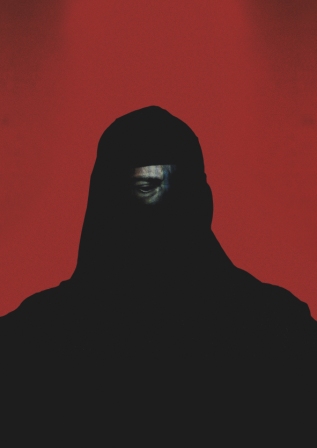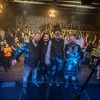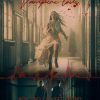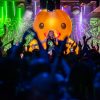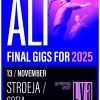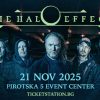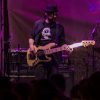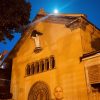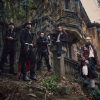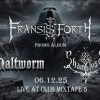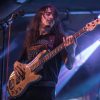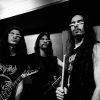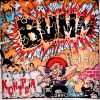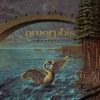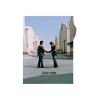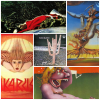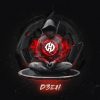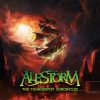Интервю с LAIBACH
Few days before Laibach‘s concert in Sofia, we had the opportunity to ask some questions related to Laibach‘s new album; past, present and future of the project.
MH18: You have visited Bulgaria few times already and I doubt it there is extreme music fan who did not listen to your music, however may I ask you to tell us few words about yourself and your musical and ideological concepts
Laibach: We are no ordinary type of group/We are no humble pop musicians/We don’t seduce with melodies/And we are not here to please you/We have no answers to your questions/Yet we can question your demands/We don’t intend to save your souls/Suspense is our device/We are Time. (WAT)
MH18: Laibach went through many transformation and crises. How did you preserve your musical identity and survived as artists?
Laibach: We’ve avoided listening music and we eat a lot of spinach.
MH18: You music is quite diverse; you are using variety of styles and sounds. What is the link between industrial, pop, classical, techno music?
Laibach: Sound is the link and so is technology.
MH18: How do you start composing? What comes first – the idea, lyrics or music?
Laibach: Our work is industrial, our language political. Laibach works as a team (collective spirit), according to the model of industrial production and totalitarianism, which means that the individual does not speak (or compose); the organization does. The principle of work is therefore totally constructed and the compositional process is a dictated ready-made, and same goes for lyrics. Industrial production is rationally developmental, but if we extract from this process the element of the moment and emphasize it, we also assign to it the mystical dimension of alienation, which reveals the magical component of the very industrial process. Repression over the industrial ritual is transformed into a compositional dictate and the politicization of sound can become absolute sonority.
MH18: Challenging each concept and idea is your usual way to express your positions. What is the place of war and totalitarianism symbols in your performance? Do you challenge them or conform with it?
Laibach: We challenge war and all its symbols to confront with themselves.
MH18: During the years you have been accused many times in far right (left) nationalism. What is your response to this?
Laibach: We don’t response; people have the right to think of us whatever they want. Laibach cannot be offended by such accusations and we do not need to defend ourselves.
MH18: Few years ago you have performed in North Korea, which is very hot topic recently. What is your impression from the people and culture of North Korea?
Laibach: Yes, we went to Pyongyang in 2015 to do a concert in order to support and boost the unification process between North and South Koreas. North Korea is a completely different world from anything you can imagine from European perspective, reality in North Korea is basically surreal. Although we did have some ‘insider’s’ information from people who already visited the country, we still had all the usual preconceptions that people on the West normally have about it. When we arrived there it surprised us most that it was just like we expected, but it was also completely different. North Korea is much more than what media in the West is keep on repeating about and generally we found most of the tabloid stories and stereotypes about the DPRK utterly false. The country is still quite poor and isolated and has an oppressive political system, but positive changes and energy is visible everywhere. People are generally very kind and they seem to poses the precious wisdom that we Europeans don’t. We couldn’t find any cynicism, sarcasm, irony, vulgarity and other ‘western cultural characteristics’ there, only basic modesty, kindness, proudness and respect. They love to laugh, smile and joke as well, much more than people back in Europe do nowadays. North Koreans are also very well dressed, simple but elegant, and they learn foreign languages; children begin to learn English at the age of 7 and we meet many who spoke other world languages as well. Pyongyang that has been completely bombed and erased by Americans during the Korean War is today clean, well-kept and colorful city with impressive socialist and post-modernist architecture, sculptures and parks. Also its shops have a striking ‘pop art’ character and they look like if Jeff Koons would have designed them, along with sculptures in their parks. We have therefore been sincerely impressed by North Korea and we advise people to visit this country before it’s too late.
MH18: “Also Sprach Zarathustra” sounds a lot industrial but also atmospheric, dark, with huge classical music influence, ambient and contains amazing mixture of sounds and styles. Tell us more about this beautiful experiment you created.
Laibach: We can’t tell you everything – some things you also have to make up also by yourself… We composed Zarathustra because we were invited by Slovenian theatre director Matjaž Berger to create music for the play, based on this famous Nietzsche’s work and performed by the Anton Podbevšek Theatre ensemble. AP Theatre is located in Novo Mesto, Slovenia, and it is actually named after the Slovenian avant-garde poet from the 20′, whose poems are characterized by the so-called titanic lyric subject, with the features of Nietzschean over-man and Whitman’s pantheism. His only collection of poems is called ‘Man with Bombs’ and beside Nietszche’s novel he was in fact also important inspiration for the music that we wrote. Theatre play needed minimal and ambiental music, with the Laibach signature, and that is what we did. For album release we later recomposed and modified mainly fragmented parts into 12 tracks. We never studied Nietzsche systematically or were obsessed by him but some of his ideas are ‘incorporated’ within our laibachian plasma, so it wasn’t that difficult to put this music together.
MH18: Nietzsche’s Thus Spoke Zarathustra is quite controversial and uneasy to accept as personal manifest unless we are able to accept our weakness too. Who is the “übermensch” – our future selves, the perfection we aim to, or this is the essence of the dictator – powerful and unscrupulous creature? Is God still dead?
Laibach: We first and foremost see Zarathustra as deeply moral, anti-nihilist, contemplative and religious work that actually corresponds well with the current confusing metaphysics of the time and self. Its concept of the overman is about self-overcoming. It meant someone who could live beyond good and evil, beyond conventional values, who refused to appeal to herd instincts. It also involves an attitude towards life when one may feel despaired and feel life is meaningless. In wider social terms overman is the one who is willing to risk all for the sake of enhancement of humanity. Regarding the death of God – Nietzsche may have tried to kill him/her/it but only to establish a new, better and more humane one – God is dead, long live Übergod/Übermensch. But here Nietzsche actually failed; it seems to be impossible to get rid of God; there’s always something of him/her/it somewhere and the more we try to ignore him/her/it the more he/she/it returns.
MH18: Each topic of the albums had so far can be linked to the current political and social situation in the world. How Nietzsche relates to 2017 year?
Laibach: As one of the foundations for existentialism and within the light of the dominant political and social ideology of our time, based on morality that serves the economy of the ruling class, strongly infected by nihilism, all the Nietzsche’s primary themes from Zarathustra’s novel are definitely important and very relevant again. Nietzsche for instance anticipated our current cultural and political climate. From his late 19th-century perch, he warned that Europe’s increasingly democratic states would fall into parochialism and mass hysteria.
He promoted a grand unification of Europe and advocated trans-national politics that would transcend petty nationalisms and in which culture and art could thrive. For Nietzsche, culture also has to do with overcoming yourself, and anything that is static and non-moving is the death of culture. All this nostalgia and looking back is poisonous to culture because it stunts any possibility of progress. He also hoped for the emergence of a kind of trans-European elite that can lead this cultural and political revolution. What he witnessed instead (and what is now happening again) was more fragmentation, more nationalism, more tribalism, and more nihilism. Among other things Nietzsche also predicted what he calls „wars to determine the future of mankind,“ which are taking place in the shadow of God. And his reasoning is that the death of God reopens the question of what we want humankind to be. So many of Nietzsche’s ideas are still relevant and they are there to help people interpret the current political and social topics.
MH18: What album you created in the past you consider most relevant to our current world?
Laibach: They are all relevant but that’s not up to us to judge.
MH18: Your performance also includes significant part of visual art which is another dimension of the presentation of your music. Do you believe that a musical performance definitely needs visualization and what is your reason to create it?
Laibach: Of course not, but visualization at concerts is an added value that enables an extended perception of music. A concert is by definition a multimedia event, which is also viewed and not only listened, and this is the main difference that the audience gets at the concert. Such event opens up enormous possibilities for the combination of sound and vision, but requires more work, resources and people. It is also necessary to take into account a healthy balance between the two, that one does not overcome the other.
MH18: In the past you toured with classical music – Bach, Wagner, do you think you may continue performing classical music and what would be your next composer choice?
Laibach: We will definitely continue performing also classical music and at the moment we are already working on a project in collaboration with the Lviv Philharmonic Orchestra and the mixed choir. It’ll be our interpretation of the third symphony (Sinfonia Sacra) of the Polish composer Andrzej Panufnik, which the group undertook at the initiative of Adam Mickiewicz Institute (Instytut Adama Mickiewicza) and we’ll premierly present it on May 12th in Lublin, at the Festival of traditional and avantgarde music.
MH18: Outside Laibach, what is your favourite activity? Which is your favourite author, literature genre?
Laibach: There is no ‘outside Laibach’ for us. But we practice ‘sport and chess’ if this is what you are asking. We are cycling, skiing, play basketball, climbing and canoeing, etc, etc. We also read different literature, watch films and listen music and we refuse to reveal anything more.
MH18: Which musicians influenced you when you started with Laibach?
Laibach: A lot of music influenced us when we started with Laibach.
You can find a list here:
The Beatles – Sgt. Pepper’s Lonely Hearts Club Band, Bob Dylan – Highway 61 Revisited, The Rolling Stones – Let It Bleed, The Jimi Hendrix Experience – Electric Ladyland, The Doors – The Doors, John Mayall – The Turning Point, Frank Zappa – Hot Rats, Serge Gainsbourg – Histoire de Melody Nelson, T. Rex – The Slider, David Bowie – The Rise And Fall Of Ziggy Stardust And The Spiders From Mars, Pink Floyd – The Dark Side Of The Moon, Kraftwerk – Radio-Activity, Joy Division – Unknown Pleasures.
Comment from Laibach you can read here
MH18: What type of music do you listen at home, in the car?
Laibach: We listen a lot of different music but we don’t like to drop names and talk about our preferences in the press, so let this question also stays unanswered.
MH18: After all, what we can expect on 24th of March, here in Sofia? Do you keep some surprises for Bulgarian audience?
Laibach: The less it expects the more it will get. In principle we will present what the band is currently presenting, which is primarily the last album Also sprach Zarathustra. Maybe in Sofia, where we have not played for some time, we will also perform some older songs from previous albums.
